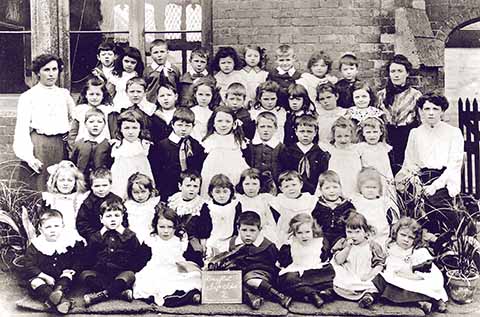Longfleet School log
Roger Guttridge delves into the history of a school and pupils
Published in March ’19

Infant class 2 at Longfleet St Mary’s in 1897. The teacher far left is Miss Saville (later Mrs Dewland)
On 27 October 1863 at Poole’s Longfleet St Mary’s School. First Tom Duffin was caught playing truant and ‘appropriating the school pence given him by his parents’, for which offences he was confined to the school for a week. Then fellow-pupil Mary Cox had a painful mishap after she and her friends ‘wandered from the playground to the sandpit near’ during their dinner hour. Mary was ‘performing evolutions on the railings’ when she fell and dislocated her arm.
A week later eight-year-old George Brown and Tom Cobb, aged ten, were ‘taken from the school and put to work’. The pair had always been ‘very irregular in their attendance, consequently they know nothing. Ignorance is thus perpetuated to the country, against which might schools work but feebly.’
The incidents are among many fascinating entries in the Longfleet School logbooks, which survive back to 1863. The school – now Longfleet Church of England Primary – stood almost opposite Poole Hospital in Longfleet Road until it moved to its present site in Jolliffe Avenue in 1995.
The logbooks offer a colourful insight into the daily workings of a Dorset school 150 years ago. One entry concerns co-education: ‘The evils of a mixed school [are] shewn by discovery made of certain boys and girls in the school contriving walks together in the evenings… and during the dinner hour,’ noted the logbook-keeper on 20 September 1872. ‘The division between the two playgrounds is not complete and communication is not sufficiently difficult.’
As in many Victorian schools, absenteeism was a common problem – mostly because of pupils’ family responsibilities. ‘Sent to look up absentees,’ says the entry for 1 July 1869. ‘Found some nursing babies, others tending sheep and others “wanted at home”.’
In 1864 attendance was hit by potato planting in March and by the harvest in August. The arrival of a circus or a ‘wild beast show’ would also cause mass absenteeism, ‘circuses being always attractive in this neighbourhood’.
Many pupils are named for minor criminal offences both in the school and outside. The above mentioned Tom Cobb was a serial offender, who ‘received corporal punishment’ after stealing another pupil’s new copy book and then lying about it. Infant James Cobb was ‘very stubborn’ and ‘kicked at his teacher’, for which he had his boots drawn off!
Parent Mr Conway started legal action in 1894 after his boy received ‘three stripes with the cane on his posterior, leaving two marks’. Mr Conway later ‘found it best to withdraw the summons’, although how he was persuaded is not recorded.
Charles Rowthorn’s name was removed from the register in 1865, ‘he being sent to prison for stealing, with others, pencil cases from a stationer’s shop’. The following year, four boys were fined by magistrates for ‘playing bundies in the streets’ – whatever they were.
Several tragic deaths are also recorded: George Cobb, aged 14, ‘drowned whilst scudding in a boat alone’; Albert Cherrett ‘died from the bite of a donkey’; and Jessie Williams, an infant, lost her life to whooping cough. Frank Moody was more fortunate. He had eight days off school after swallowing a pin, but returned having ‘passed the same yesterday’. In 1899 pupils Howard Kendall and Ernest Williams were commended before the whole school after saving George James from drowning.
In 1885 Mr Pratt of Norwich brought his collection of ‘English serpents and foreign insects’ to show the scholars. ‘The difference between poisonous adders and harmless snakes was made very clear by the exhibitor.’
The following year, a schools inspector criticised Longfleet because its second standard pupils were still using slates to write on. ‘In all the best schools in this district, the children write on paper in this standard,’ he said.
In 1900 the vicar presented pocket knives and penknives to 28 boys as a reward for their good attendance and conduct records – gifts that would perhaps be less appropriate today.
In the 20th century, several pupils went on to become high-achievers. As an aerospace engineer, Ron Toms helped to design Concorde before joining NASA, where he became mission team leader for Voyager, Viking and Mariner missions and played a leading role in the Apollo moonshots. Ron, who died in 2006, briefed the Apollo astronauts about their scientific work on the moon, including seismic tests and collecting good rock samples. He was in Mission Control, Houston, when Neil Armstrong took his historic ‘giant step for mankind’. He personally directed Apollo 12 astronaut Al Conrad as he recovered a camera that had been left on the moon for 30 months.
Footballer Jimmy Allen played for the Longfleet School team and Poole Town before moving to Portsmouth in 1930 and Aston Villa in 1934 for the then record transfer fee of £10,775.
Other Longfleet old girls and boys include TV actress Susan Skipper, star of Don’t Wait Up; fighter pilot Tommy Rigler, whose Battle of Britain exploits earned him the DFC; Rod Stewart’s drummer Tony Brock; and former Mayors Renee Montague and Peter Coles.

